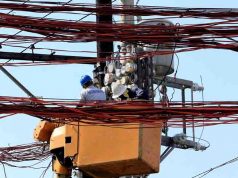MANILA – Two lawmakers have offered proposals to end the “paralysis” in the power sector — as projected by new Energy Regulatory Commission chief Agnes Devanadera — arising from the Ombudsman’s move to suspend for one year four ERC commissioners, thus leaving in limbo numerous contracts that ERC as a collegial body must pass upon.
Sen. Win Gatchalian, who chairs the Senate Energy Committee, urged Malacañang to appoint Acting Commissioners of the ERC during the period of suspension of the four commissioners, who were found guilty of not implementing the Competitive Selection Process (CSP), thus allegedly favoring some electric utilities.
“The vacuum of leadership in ERC could result in a standstill in the operations of the collegial body. This will in turn have an effect on our future power supply, resulting to the possibility of blackouts. In this light, I’m urging Malacanang to appoint Acting Commissioners to perform the duties of the suspended Commissioners as soon as possible,” Gatchalian said.
A similar proposal was made in the House by Bagong Henerasyon Party-list Rep. Bernadette Herrera-Dy. She said Sunday the President’s legal advisers could turn to Sections 16 and 17 of Chapter 5 of the Administrative Code of 1987, which allow for temporary appointments lasting up to one year.
“The EPIRA Law, which includes the revised charter of the ERC (Chapter IV), does not provide for appointments in case of temporary vacancy, in which case, it is the Administrative Code that would apply,” she argued.
“May I suggest further that two of the temporary appointees be chosen from among the ranking career civil servants of the ERC who have no pending Ombudsman or court cases involving corruption, and that the two other temporary appointees may be borrowed either from other energy agencies or from the University of the Philippines on secondment,” said Herrera-Dy, a member of the House Committee on Energy.
“In addition, the temporary appointees ought to possess the qualifications similar to those of ERC commissioner as stated in the EPIRA Law (RA 9136).” Another factor to consider, she said, are the terms of the appointment of the suspended ERC commissioners.
If one or some of them have terms expiring within the one-year suspension from the Ombudsman, then it would save the government a lot of trouble or hassle later on if one or some of the temporary appointees could be given permanent appointments effective the day after the expiration dates, she added.
A COLLEGIAL BODY
The ERC, as electric power industry regulator, is composed of 4 commissioners and 1 chairperson. The collegial body requires the presence of 3 members in order to issue orders, decisions, and resolutions. In this situation, according to Gatchalian, the absence of 4 of its members leaves the body “powerless in making decisions critical to the energy sector”. Its chair Devanadera was appointed just this November and will serve the unexpired term of Jose Vicente Salazar until July 2022.
In a press conference on Friday, Devanadera raised the specter of “paralysis” in the power sector, given the yearlong suspension order on four commissioners. The earliest that this could be broken is June 2018, when two of the four are due to retire, and the President can then appoint their replacement.
Gatchalian, however, thinks that appointments can be made sooner. He said Executive Order No. 292 or the Administrative Code of 1987 gives the President the power to temporarily designate a competent person or any official currently in active government service to perform the functions of an official working in the Executive branch who is unable to perform his duties. In which case, the President’s temporary designation should not exceed a period of one year.
Similarly, the Supreme Court in a 2011 case, General v. Urro, ruled that President has the power to make acting or temporary appointments as long as he is not prohibited by the Constitution or by the law in order to prevent a hiatus in the discharge of official functions, Gatchalian pointed out.
“We want to ensure that ERC would continue its service despite the suspension ordered on most of its Commissioners. At present, the total value of all pending applications for ERC approval is 1.5-trillion pesos,” the lawmaker said.
On December 11, Commissioners Gloria Victoria Yap-Taruc, Alfredo Non, Josefina Patricia Magpala-Asirit and Geronimo Sta. Ana were administratively held liable for conduct prejudicial to the best interest of service, aggravated by simple misconduct and simple neglect of duty.
This stemmed from a complaint filed by members of Alyansa Para sa Bagong Pilipinas in November 2016 that questioned the deferment of CSPs in early 2016 and for granting seven Power Supply Agreements (PSA) of Manila Electric Company, despite the period of suspension of the CSPs.
The four Commissioners shall serve the suspension of one-year without pay.
Their suspension will put on hold funding for P1.588 trillion worth of energy-related projects and capital outlays, ultimately affecting millions of Filipinos, Devanadera had said on Friday.
“The paralysis starts today,” Devanadera said in a news conference a day after she learned about the suspension of the ERC commissioners.
She said she had prepared a letter for submission to the Office of the President to lay down the impact of the suspension. No recommendation, suggestion or plan of action is in the letter but simply an enumeration of the possible result of any “non-action” on the part of the commission, she added.
Devanadera, who officially reported for work at the agency on Dec. 4, said she had learned about the suspension only yesterday when ERC employees were having their Christmas party.
She said the commissioners — Alfredo J. Non, Gloria Victoria C. Yap-Taruc, Josefina Patricia A. Magpale-Asirit and Geronimo D. Sta. Ana. — were “disappointed” by the decision of the Ombudsman.
Along with the former chairman, the four commissioners were charged in connection with the revised implementation date of the competitive selection process (CSP), which Alyansa Para sa Bagong Pilipinassaid favored a few power supply contracts.
CSP requires these contracts between power generation companies and distribution utilities to be subjected to price challenges, a process that is designed to lower electricity costs.
Devanadera said the “debilitating impact” of the Ombudsman’s decision to suspend the four incumbent commissioners “will render the operations of the agency in severe paralysis.”
She said as a collegial body, the presence of at least three members of the commission is needed to constitute a quorum to enable the ERC to adopt any ruling, order, resolution, decision or other acts of the commission in the exercise of its quasi-judicial and quasi-legislative functions.
Devanadera said in terms of the assigned monetary value, the pending approvals are broken down as: P384.5 billion in capital expenditures; P2.2 billion in point-to-point transmission lines; P900 million in the sale of subtransmission assets.
Also pending are P1.2 trillion in power supply agreements, which the ERC counted as 135 pending cases. A total of P526.7 million accrued interest in feed-in-tariff allowance fund are also awaiting ERC action.
73.6M FILIPINOS AFFECTED
She said with the country’s 18.4 million energized households with four members each, then a total of 73.6 million Filipinos would be affected by ERC’s non-action.
Devanadera said a decision of the Ombudsman in administrative cases “shall be executed as a matter of course,” thus she was seeking the President’s guidance in its implementation.
She said she wanted to give “due respect” to the decision of the Ombudsman and would seek the President’s “sound discretion” on the matter.
She clarified that cases are directly against the four commissioners and not against the commission. “Out of respect [to the Ombudsman], they [the commissioners] are not doing the usual things, but there are many things that they can do, which is part of their function,” she said.
“I have embarked on a zero-backlog [program]. They have to go through their files,” she added.
Once the suspension takes effect, the earliest that the ERC can have a quorum is by mid-year when two commissioners retire and their replacements are appointed. Mr. Non and Ms. Yap-Taruc are retiring in June.
Devanadera said the suspension order will also have an impact on the government’s “Build, Build, Build” initiative, which has lined up many of the projects in the provinces.
“Investors might be discouraged from helping develop the energy sector,” she said. “These are the hard facts,” she said.









